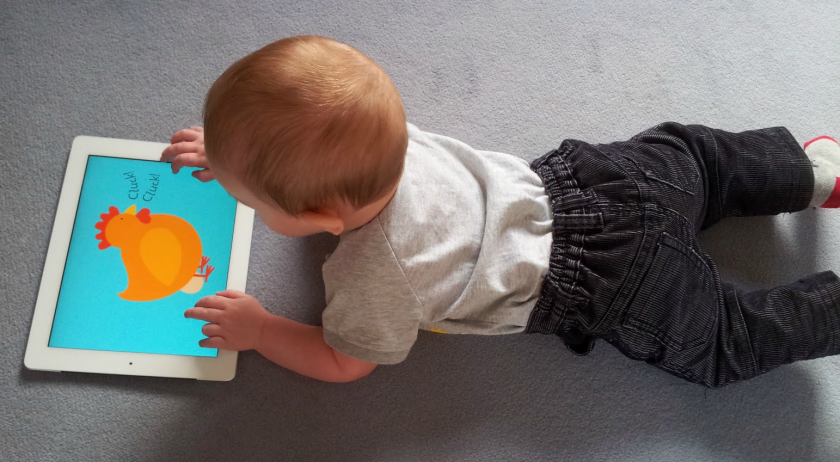Newborns may not “play” in the same way that older children do, but they are certainly very busy exploring their world. Beginning in infancy, play helps children learn how to solve problems, relate to their peers, follow rules, and understand their emotions. Understanding touch and the impact of their bodies on their environment, developing an awareness of all their senses, and interacting directly with other people are the primary goals of play for newborns to children up to 24 months.
Play is an opportunity for babies to have fun and engage in pleasurable activities with their parents and other caregivers. Early play opportunities provide them with a chance to explore and test hypotheses about their world. When babies play with a rattle, squeeze their food, touch their father’s nose, or put an object into their mouth they are experimenting and learning about their world. This type of “play” is not dissimilar to how we observe children “playing” with a new video game or cell phone, trying things to discover outcomes.
Below, you’ll find some play diet recommendations for developmentally-healthy activities for children between 0 and 24 months across five types of play — social, active, creative, free and digital play:
Social Play
Social activities for babies and toddlers include making funny faces with their parents or other family members, playing peek-a-boo, and engaging in assorted activities that attempt to get a response from others in their environment. Productive social play could involve making sounds and mimicking parents or others. Play with peers is almost exclusively parallel, occurring together but not actually engaged with each other.
Active Play
Active play for babies involves simple movements such as grasping a parent’s finger, reaching out for things, and learning to walk as a toddler. Rolling and kicking balls can also be great fun, along with demonstrating throwing or shooting motions by parents who envision their children becoming baseball or basketball players.
Creative Play
Creative play for infants involves simple movement of objects. As babies move into toddlerhood this could include the use of blocks or other household materials such as empty boxes for making their own types of creations. The beginning of make-believe play emerges around 18 months and is related to language and imitative skills.
Free Play
Free play for babies consists of exploring their environment. This could involve touching the facial features of a relative or learning to make noise/music with pots and pans. Free play is also an opportunity to experience sensory parts of the environment, hearing sounds, seeing colors and shapes, and touching different kinds of objects and textures.
Digital Play
Digital play requires a degree of understanding of the non-tangible, symbolic nature of digital media. Because babies’ play is not symbolic, digital play is likely to be lost on them. There is substantial research (REF) to suggest that children prior to the age of 18 months do not learn or benefit from their involvement with television programs or most digital media. This is not to say that young children do not learn from listening to music or enjoying digitally-based, sensorimotor types of activities that involve colors, lighting, and sound. While it is not unusual these days to see a 10-month-old child “scratching” on an iPad, in all likelihood the child is not “getting it.” Not only is there limited learning in this case, but also, more importantly, children lose out on valuable time for developing the critical sensorimotor understanding of their world that is necessary for learning.
The American Academy of Pediatrics suggests that children under the age of 2 not be allowed to use screen-based media. My perspective on this is somewhat different. Based upon many observations and reports of 12- to 24-month-olds learning the letters of the alphabet, shapes, and numbers using iPad and tablet apps, it is clear that some children are developmentally ready for screen-based media prior to the age of 2. Studies suggest that children between the ages of 18 and 24 months can benefit from watching videos that elicit direct participation and have stories that are linear and narrative in nature and are slow-paced and repetitive. However, I strongly caution against substituting too much digital play for the core sensorimotor, social, and unstructured play that facilitates learning and exploration at this age.
Digital-play strategies for children between the ages of 0 and 24 months
Digital play should always guided by parents. The vast majority of digital play for children this age involves them sitting on parents’ laps or right next to them on a chair.
Learning occurs primarily through interaction and conversation. Assume that the majority of what children will learn from digital play at this age is talking with you about what they are doing.
It is OK for parents to use digital-play time as an opportunity for a break. A short reprieve with a video will not harm your toddler if you need time to make dinner, help an older child with homework, or take care of an even younger child.
Pay attention to a toddler’s lack of interest in learning letters and shapes from apps and screen-based technologies. This may be an early signal that a child is not ready for learning technologies or that there may be mild difficulty in academic learning.
Recommended games and apps:




